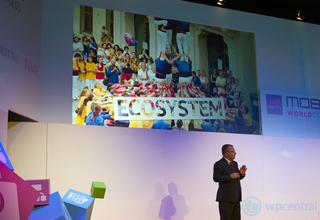Nokia's Stephen Elop: The future is the ecoystem

One of Mobile World Congress's keynote speeches just wrapped up and this one featured three different speakers: Dennis Crowley, founder and CEO of Foursquare, CEO of HTC Peter Chou and CEO of Nokia, Stephen Elop. The topic was simple: Mobile OS & Applications, specifically what challenges each CEO is facing and how the mobile OS can transform technology.
Each CEO gave their take on what they do and what they are doing for the future. Crowley is concerned with data aggregation on Foursquare and how to "give that back" to the customer in a useful manner. Chou was interested in the infinite possibilities of smartphones but more importantly how to smartly managed that e.g. HTC Sense. Finally Nokia's Elop focused on three areas:
- Ecosystems including big apps versus local apps, with the latter being Nokia's concern. This can be seen in things like App Highlights on their phones.
- Location-based services e.g. filling in the "Where? equation" on smartphones. We see this demonstrated with their Drive, Maps and Transport apps
- How to monetize this ecosystem for the smaller developers in emerging markets
Elop's discussion was frankly much more interesting as he was laying out, in no uncertain terms, what Nokia's plans were. They see growth in the untapped emerging markets, where 60% of cell phone users do not have a smartphone yet. He reiterated once again how he thought Nokia could be a "disruptive force" in the industry with Windows Phone (versus iOS or Android) and that Nokia had a great symmetry with Microsoft in regards to software/hardware design.
The focus by Nokia on local apps is clearly present in pushing into newer markets including Indonesia where they had 800 developers code for one day to create new locally-focused apps for that region. Likewise, their ability to offer carrier billing for the Marketplace in many areas (with more to come) is a bold attempt to allow those with out traditional forms of credit to participate in the app purchasing process. This is no little thing to be dismissed as the potential here for Nokia is massive and they seem to be having success with it. Likewise, they've adopted micro-payment systems allowing them to further expand with their current 150 operators in more than 40 countries.
Another interesting aspect of his talk was the focus on "social app discovery" or what he also called "viral app exchanges" for Marketplace growth. In essence this involves the idea of sharing apps one-on-one or one-to-many (e.g. blogs, presumably) and how this will help create a "sustainable app economy" built around smaller developers.
Though no framework for such "viral app exchanges" was proposed it seemed obvious to us that when Nokia finally puts NFC into its phones, this will be one of the key uses. Such a system would presumably work by simply placing your phone up against a friend's phone, automatically installing the app on their device.
This is all frankly great news as Nokia clearly has a very focused approach to gaining market share. They are not here to just build phones but to build the ecosystem around it, spreading it into new areas and not just taking on the iPhone or Android directly (though he did call Android their #1 priority in competition).
Get the Windows Central Newsletter
All the latest news, reviews, and guides for Windows and Xbox diehards.

Daniel Rubino is the Editor-in-chief of Windows Central. He is also the head reviewer, podcast co-host, and analyst. He has been covering Microsoft since 2007, when this site was called WMExperts (and later Windows Phone Central). His interests include Windows, laptops, next-gen computing, and watches. He has been reviewing laptops since 2015 and is particularly fond of 2-in-1 convertibles, ARM processors, new form factors, and thin-and-light PCs. Before all this tech stuff, he worked on a Ph.D. in linguistics, watched people sleep (for medical purposes!), and ran the projectors at movie theaters because it was fun.
